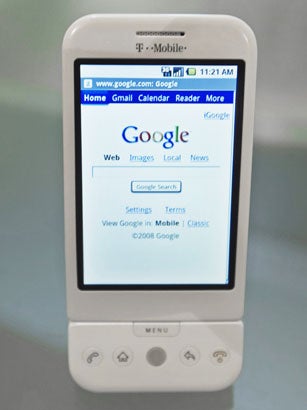More mobile phone makers back Google's Android

Fourteen of the world's largest mobile phone and chip makers, including Sony Ericsson, Vodafone Group and ARM Holdings, joined the Open Handset Alliance on Tuesday to support the Android mobile device platform developed by Google.
The new members' pledge to back the Android software is a significant feat for Google in the mobile phone industry, as its T-Mobile G1 phone takes on rival Apple's popular iPhone 3G.
But despite the big-name additions to the Open Handset Alliance, analysts say what matters is whether the new members introduce more Android-supported smartphones in 2009 and 2010 to compete with rivals such as Symbian, used by Nokia.
"It's great to get these folks on board...now (the Open Handset Alliance) has to make sure these licenses actually ship products," said research firm Jupitermedia's vice president of mobile strategy, Michael Gartenberg.
The first company of the fourteen new members set to introduce a mobile device that uses the Android operating system is Sony Ericsson, a joint venture of Japan's Sony Corp and Sweden's Ericsson. Ericsson said on Tuesday it plans to introduce the Android-supported platforms in mid-2009.
"Android is set to become a significant application framework for mobile phones," Ericsson's head of mobile platforms, Robert Puskaric, said in a statement.
The Open Handset Alliance said on Tuesday that each of its members commits to developing applications and services for mobile phones and handsets using the Android platform or designing Android-compatible mobile devices.
Taiwan's Asustek Computer Inc, Toshiba Corp and Garmin Ltd also pledged their support, bringing the total number of companies in the Open Handset Alliance to 47, the Alliance said. These companies join earlier members of the Alliance, such as the world's biggest chip maker Intel Corp and mobile phone makers Motorola Inc and Samsung Electronics Co Ltd.
Both Google and Apple have wooed developers to create applications for their mobile devices, but Apple keeps a tight grip on the iPhone's hardware and operating software. Google's Android is open to being changed by outside developers.
The addition of new members to the Open Handset Alliance gives Google-developed Android more heft in the battle over who will dominate the mobile phone software market in coming years. Android's biggest competitor is Symbian, which controls half of the market and was acquired by Nokia, the world's biggest mobile phone maker, earlier this month.
Nokia contributes Symbian's assets to a not-for-profit organization similar to the Open Handset Alliance, the Symbian Foundation. Members of the Symbian Foundation have royalty-free access to Symbian's software.
So far, 64 companies have said they plan to join the Symbian Foundation, including Japan's third-largest wireless carrier, Softbank .
Android also competes with Microsoft's Windows Mobile operating system, which has been gaining ground.
With a range of companies jumping into the Alliance, such as portable navigation device maker Garmin Ltd, Android has the potential to be featured on devices other than mobile phones. Each mobile phone maker also can modify the Android open source software, which leaves the opportunity open for many future mobile phones.
"What's fascinating about Android is it's this malleable thing. As these phones come out from other carriers it looks and operates differently," said Greg Sterling, a Web analyst with Sterling Market Intelligence. He added, "It seems more people will jump on the bandwagon."
Join our commenting forum
Join thought-provoking conversations, follow other Independent readers and see their replies
Comments
Bookmark popover
Removed from bookmarks